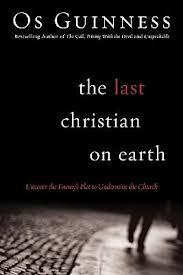The Last Christian on Earth (3): The Cheshire-Cat Factor**

In more and more areas of life, religion has become irrelevant. Modern culture has been secularized. Religion, or more specifically the Christian Church, has not disappeared. Rather, it has been displaced by the ideas and institutions of the modern world.
Religion no longer presides over much of society as it did in the past nor participates in all of life as the Christian faith is required to do. As a result, Christian institutions and ideas are displaced from the center of modern society and relegated to the margins. At one stroke, discipleship, in the sense of the Adversary’s claim to rule over the whole spectrum of life, has been effectively neutralized.
In this memorandum, the master spy, or Deputy Director, begins with a vignette from Alice’s Adventures in Wonderland to illustrate the subversion of the modern Church by what he calls the Cheshire-cat factor.
Slowly, beginning with the end of its tail, the [Cheshire] cat began to vanish until there was nothing left except the grin, which remained some time after the rest of it had gone.
“Well,” thought Alice in surprise, “I’ve often seen a cat without a grin, but a grin without a cat! It’s the most curious thing I ever saw in all my life!” …
Unlike the Cheshire cat, however, the Church is not vanishing of its own accord and cannot reappear at will. Think of it. Less than three centuries since our Operation began, and we have drained the reality out of the Western Church. Where it has not vanished entirely—in fact even where it appears to be flourishing numerically—what is left is little more than an empty, lingering grin—empty certainly, by contrast with what it once was and it was supposed to be.
Secularization is the term that sociologists use for the Cheshire-cat factor. As originally proposed, the secularization theory suggested that religion would become less and less important as the world became more and more modern. Eventually, religion would disappear altogether. But this theory has required revision for several reasons. Thus, the Deputy Director offers a corrective.
By “secularization” I mean the process through which, starting from the center and moving outward, successive sectors of society and culture have been freed from the decisive influence of religious ideas and institutions. In other words, secularization is the process by which we have neutralized the social and cultural significance of religion in the central areas of modern society, such as the worlds of science, economics, technology, bureaucracy, and so on, making religious ideas less meaningful and religious institutions more marginal. Our goals in this are simple but far-reaching: to negate the centrality of faith in life and to neutralize the Adversary’s rule.
Defined this way, secularization is deadly to the Church because a central requirement of the Adversary’s rule is integration: the integration of faith and the whole of life….
The Deputy Director goes on to point out that secularization is a process—not a set of ideas, not a philosophy.
Unlike a secularist philosophy, such as atheism or naturalism, this secularized mentality is not something people think about or choose. Rather it rubs off on them. It comes as part and parcel of objective, institutional changes that have actually occurred through modernization and cannot be avoided or simply wished away. Secularization is therefore contagious in a way that secularism never is. Wherever modernization goes, some degree of infection is inevitable. …
[S]ecularization reaches further than secularism in that it affects and influences religious people too. Secularization is a silent process that simply happens, rather than a philosophy that can be chosen or rejected. So, it subtly shapes even those people (Christians included) who would never knowingly subscribe to such a philosophy and turns them into subconscious secularists. …
Today, only the very conscientious and young hothead still attempts to carry faith out into the secular world. Most believers are as used to being frisked by secular society’s reality guards as they are to being checked for weapons before boarding an airplane, so the chances of Christians taking over any modern society are accordingly reduced to zero. …
Where secularization has occurred, we gain far more than a beachhead on the fringes of the modern world. We are able to neutralize the Adversary’s power at its very command center.
**A note on this series of posts: The literary device of The Last Christian on Earth is similar to C. S. Lewis’s Screwtape Letters. Here though, a master spy, the Deputy Director, writes a series of memos to an operative outlining strategies and giving instructions on how to subvert the modern Church. Os Guinness, an Oxford-trained sociologist, uses this device to help translate concepts from the social sciences into ideas that relate to faith and discipleship.


 November 5, 2012
November 5, 2012 







Comments are closed.